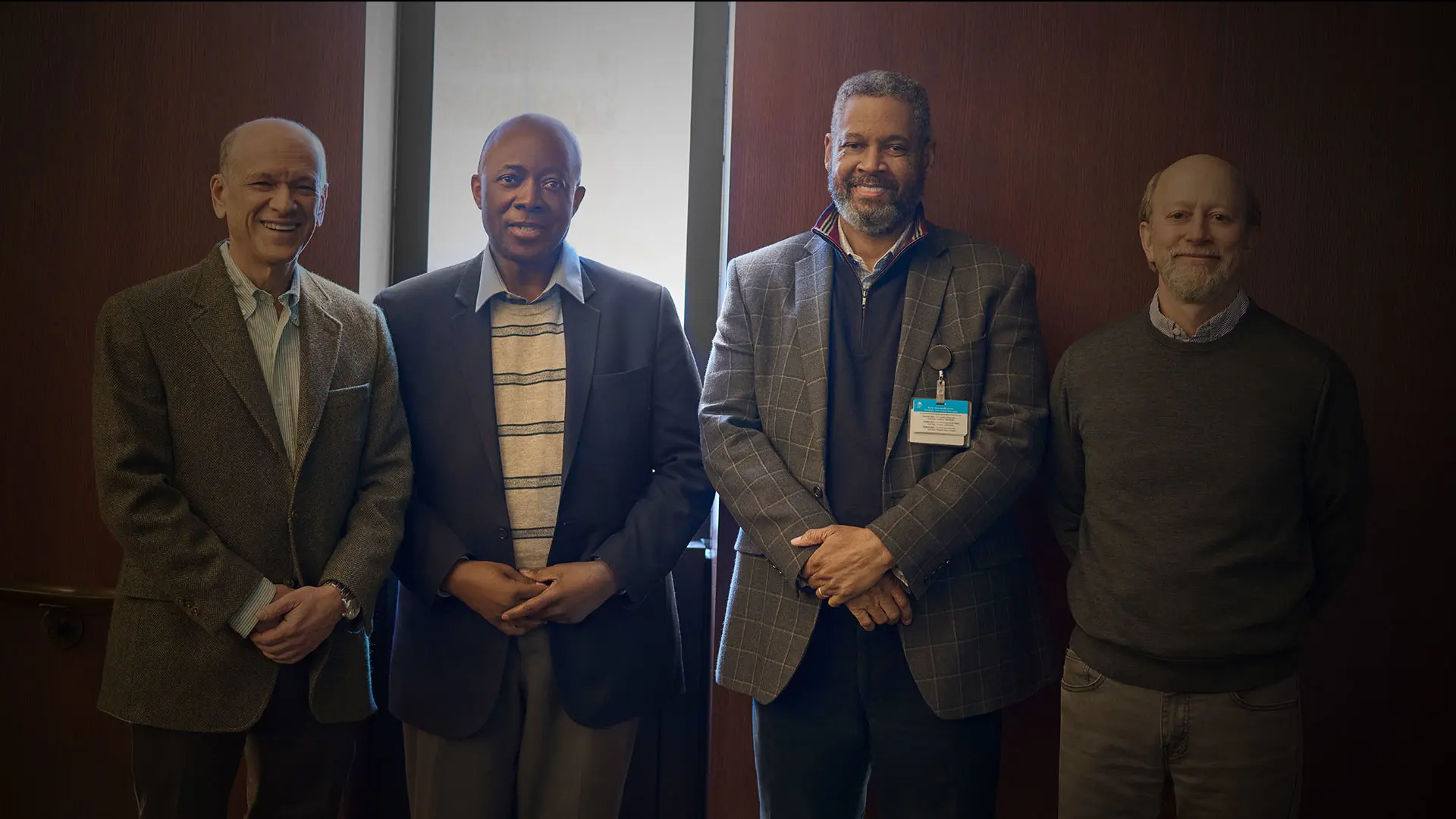“My visit as part of the Mount Sinai–Meharry Medical College Faculty Exchange Program was very rewarding,” says Dr. Chirwa, who is Professor of Neuroscience and Pharmacology. “I had the opportunity to present a seminar on my research projects being conducted at Meharry. This was coupled with personalized interactions with several Icahn Mount Sinai investigators. I see this faculty exchange program creating unique opportunities for the initiation and incubation of reciprocal and sustainable research initiatives of mutual benefit to the two institutions. This is much needed.”
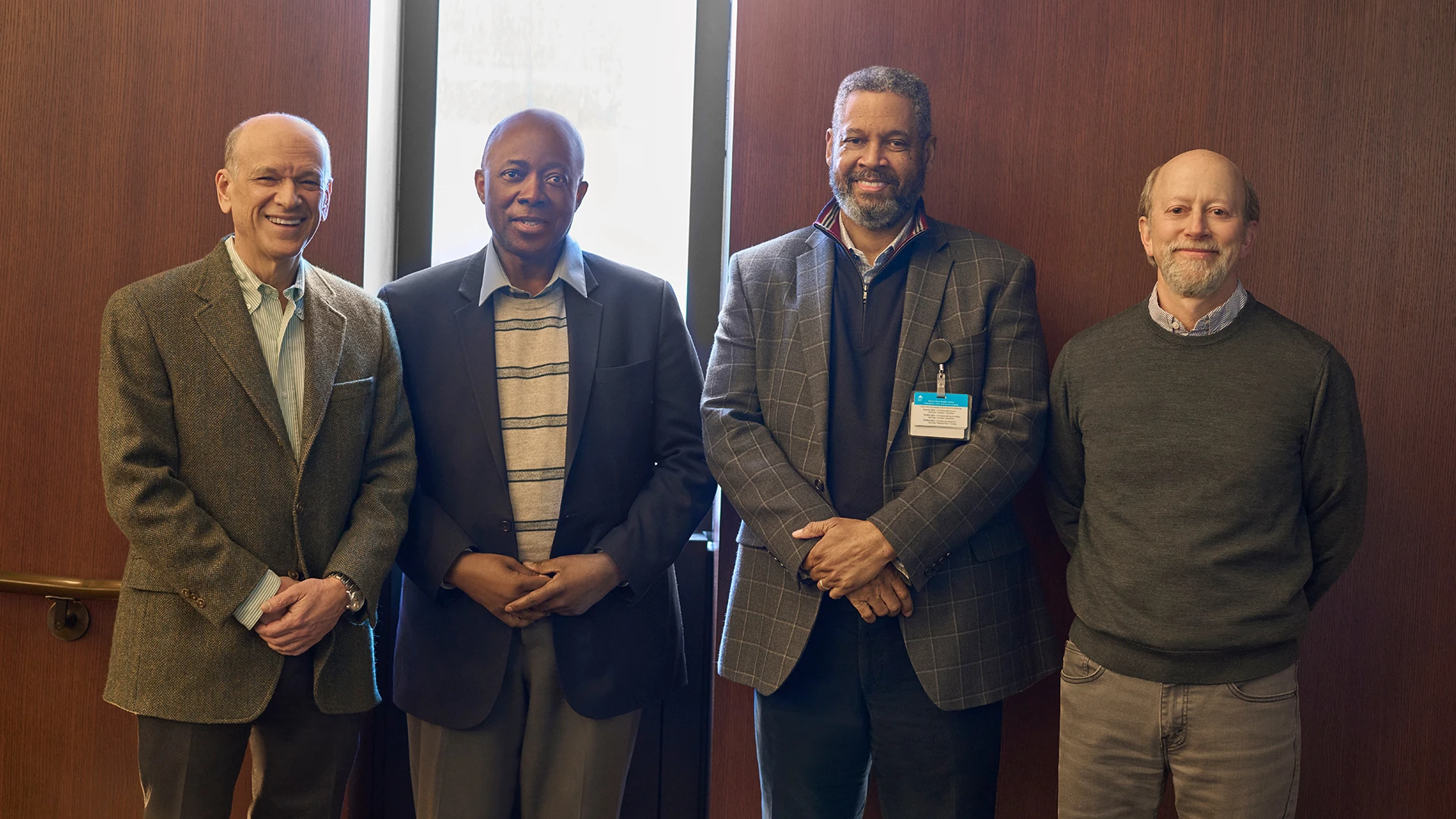
Neuroscientist Sanika S. Chirwa, MD, PhD, second from left, presented the first lecture in the Mount Sinai–Meharry Medical College Faculty Exchange Program. From left are Eric J. Nestler, MD, PhD; Reginald W. Miller, DVM, DACLAM; and Paul A. Slesinger, PhD.
HBCUs are institutions of higher education in the United States that were established before the Civil Rights Act of 1964 with the intention of primarily serving African Americans. Meharry Medical College is one of the nation’s oldest, and the largest, historically Black academic health science centers dedicated to educating physicians, dentists, researchers, computational scientists, and health policy experts. Founded in 1876, Meharry is the second oldest medical school in the country dedicated to the education of then newly freed African Americans.
Among Mount Sinai leadership attending the seminar was Reginald W. Miller, DVM, DACLAM, Dean for Research Operations and Infrastructure, Professor of Comparative Medicine and Surgery, and Professor of Environmental Medicine and Public Health at Icahn Mount Sinai. Dr. Miller also heads the Mount Sinai HBCU Engagement Initiative.
“While many institutions are new to HBCU engagement, Mount Sinai has been visiting Black colleges and universities for many years to recruit students to our various programs,” says Dr. Miller. “This new initiative is significant for three reasons: it is driven by senior leadership at both schools, our focus on developing faculty-faculty relationships is more sustainable, and we are meeting the needs of HBCU partners by capacity building. This is what we mean by a bidirectional, mutually beneficial relationship.”
Dr. Miller adds: “As an HBCU graduate [Tuskegee 1986], this resonates with me personally, and I am grateful to our institutional leadership for appointing me to this role.” According to Dr. Miller, “Neuroscience is of particular interest to the students and faculty at HBCU institutions across the nation. The opportunity to share our respective talents and infrastructure is a win-win for all.”
The faculty exchange program was created by Paul A. Slesinger, PhD, a member of The Friedman Brain Institute, Vice Chair of the Nash Family Department of Neuroscience, and the Lillian and Henry M. Stratton Professor of Neuroscience, and Professor of Pharmacological Sciences.
“The long-term goal is to strengthen connections between Mount Sinai and HBCUs. The idea of this new program is for a faculty member at a HBCU to travel to New York and meet with faculty, students, and trainees at Mount Sinai and, at a different time, have a faculty member from Mount Sinai visit their institution. We decided to first partner with Meharry with this exchange of faculty,” says Dr. Slesinger. “I am grateful for the support from the Howard Hughes Medical Institute, as a Gilliam Fellow Adviser, to help launch this program.”
The inaugural event with Dr. Chirwa was hosted by Dr. Slesinger in collaboration with the HBCU Engagement Initiative and the Diversity in Neuroscience initiative known as DiverseBrains, a vibrant effort launched by The Friedman Brain Institute in 2015. In the audience and participating in the events was Eric J. Nestler, MD, PhD, Director of The Friedman Brain Institute, Nash Family Professor of Neuroscience, and Dean for Academic Affairs, Icahn Mount Sinai, and Chief Scientific Officer of the Mount Sinai Health System. “Empirical research has shown that complex biological questions are better and more effectively addressed by a diverse group of scientists and physicians,” says Dr. Nestler. “The Mount Sinai–Meharry Medical College Faculty Exchange Program is one of several marquee initiatives through which Mount Sinai is building more diverse teams to meet today’s challenges in biomedicine.”
As part of the faculty exchange program, Dr. Slesinger visited Meharry Medical College in April, where he gave the “Distinguished Inaugural Lecture” during Meharry’s 50th anniversary celebration of its PhD accreditation of the School of Graduate Studies, originally founded in 1938.
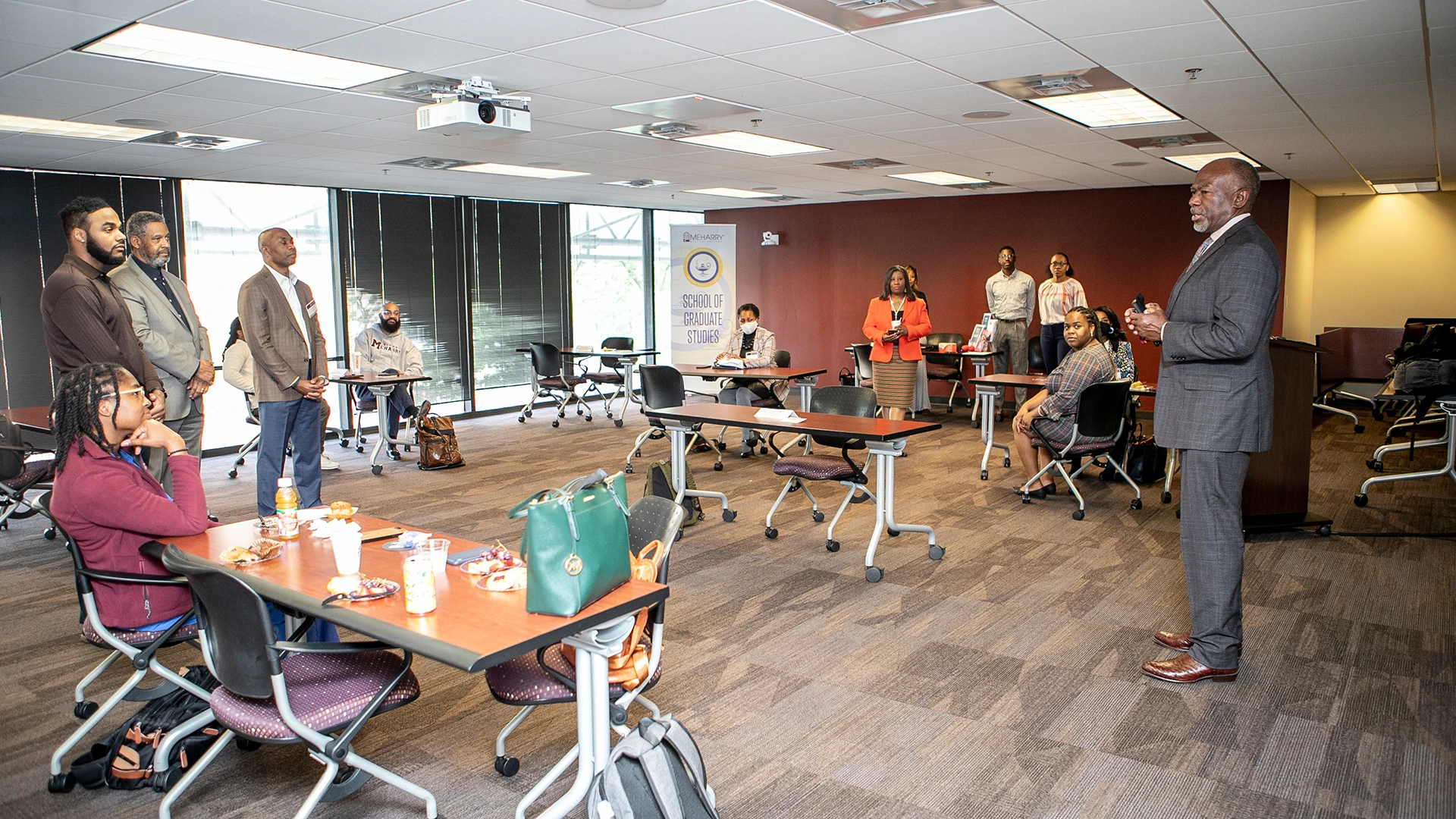
Acclaimed scientist James E. K. Hildreth, PhD, MD, President and Chief Executive Officer of Meharry Medical College, addresses guests, including Mount Sinai’s Reginald W. Miller, DVM, DACLAM, and Paul A. Slesinger, PhD, during Meharry’s 50th anniversary celebration of its PhD accreditation of the School of Graduate Studies, originally founded in 1938.
“Each of our visits involved giving a public scientific seminar, meeting with faculty individually, and having discussions with students and postdoctoral fellows over lunch,” says Dr. Slesinger. “There was an overall positive and enthusiastic response to continue these interactions between Mount Sinai and Meharry, leading to new discussions about how to strengthen this relationship.”
In the meantime, the second round of faculty exchanges is about to begin: Denise Cai, PhD, Associate Professor of Neuroscience at Icahn Mount Sinai, will be visiting Meharry in the fall. While the current focus is on neuroscience, Dr. Slesinger envisions expanding the program to include other research areas.
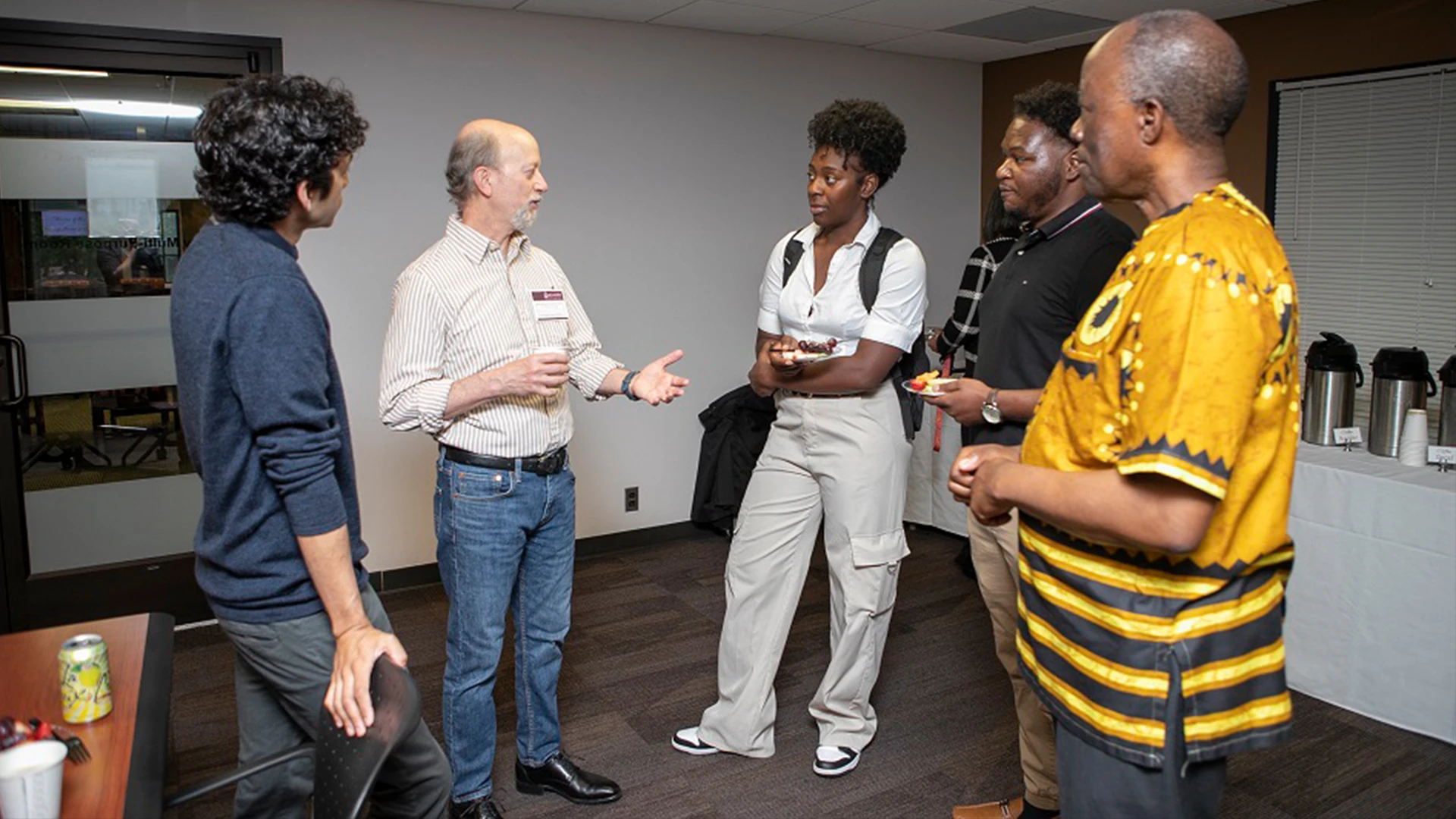
Mount Sinai’s Paul A. Slesinger, PhD, second from left, meets with PhD students from Meharry Medical College and Sanika S. Chirwa, MD, PhD, right.
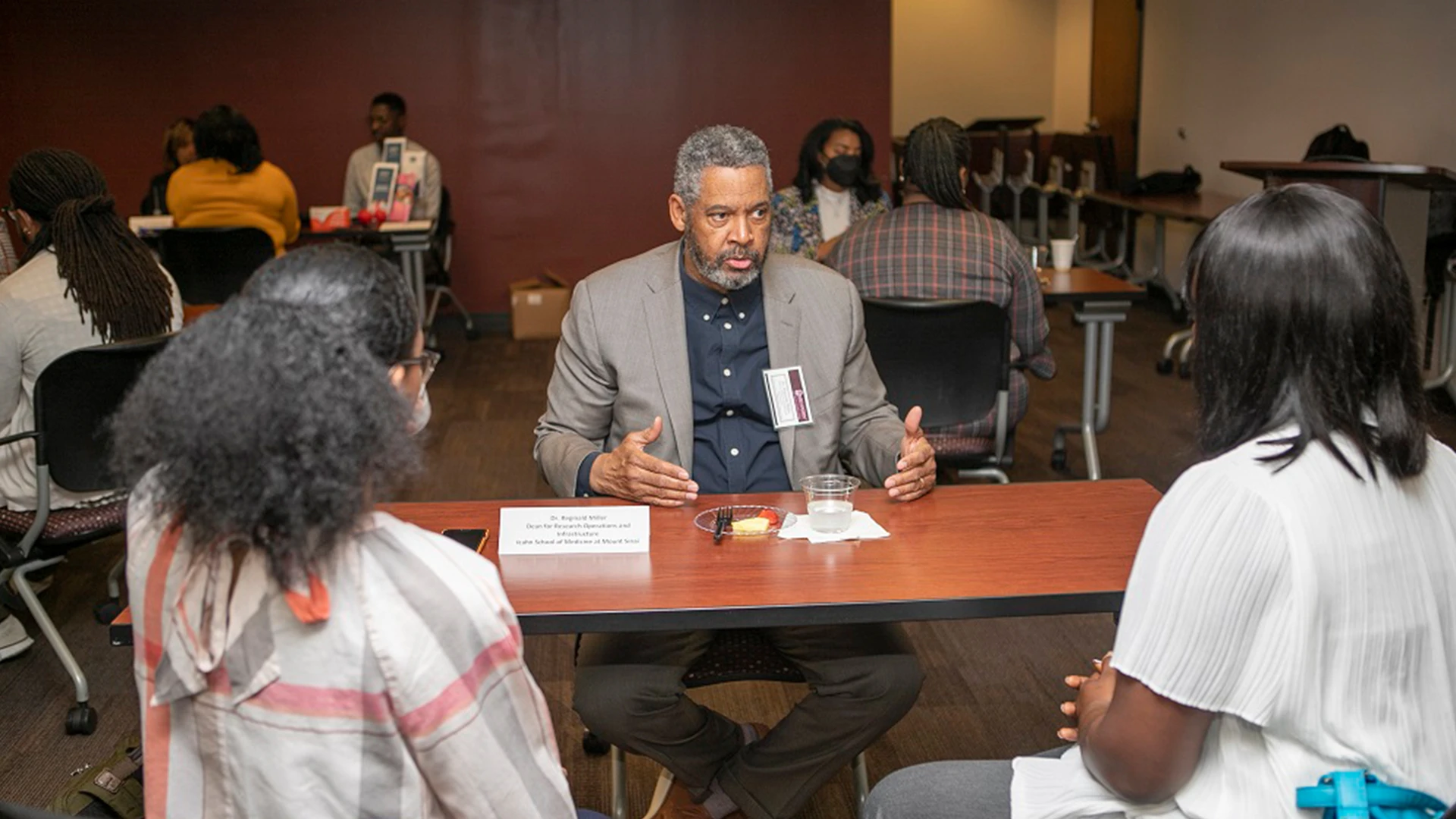
Mount Sinai’s Reginald W. Miller, DVM, DACLAM, interacts with students on the campus of Meharry Medical College.
“Meharry Medical College and Icahn School of Medicine at Mount Sinai both benefit greatly from this faculty exchange program,” says Anil Shanker, PhD, who is an integral part of this effort. Dr. Shanker is Senior Vice President for Research and Innovation, and Professor of Biochemistry, Cancer Biology, Neuroscience, and Pharmacology at Meharry Medical College. “Aside from a bidirectional exchange of invaluable knowledge in the areas of neuroscience, immunology, genomics, cancer, and health disparities, the program demonstrates our willingness to collaborate with each other and share research knowledge in scientific fields that are highly competitive. The effort is expanding the intellectual environment of mutual benefits to both institutions, and it also is increasing awareness of the excellence that HBCUs have to offer. We look forward to future engagements.”
